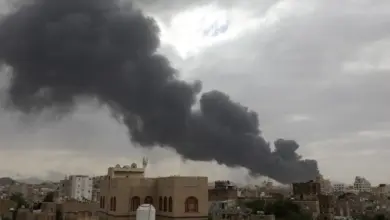Sanaa — A Gulf Arab plan for Yemen's president to step down would guarantee the veteran leader and his family immunity from prosecution, an opposition source said on Thursday, but youth activists said that should be rejected.
The United States and Gulf Arab countries including Yemen's key financial backer, Saudi Arabia, appear ready to push aside a long-time ally against Al-Qaeda's Yemen-based wing to avoid a chaotic collapse of the poorest Arab state.
Saleh's sometimes violent response to two months of protests against his 32-year rule has tried the patience of Washington and Riyadh, both of which have been the target of attempted attacks by Al-Qaeda's Yemen-based branch.
The Gulf proposal for talks in Riyadh was presented to Saleh and a coalition of opposition parties this week. Saleh welcomed it, while the opposition has withheld its response, but set conditions that may derail any talks, according to a source.
Gulf sources said the plan envisaged handing power to an interim council of tribal and political leaders who would help appoint a national unity government ahead of elections.
An opposition source said the proposal would give Saleh and his family, whose control over key posts has long angered many Yemenis, immunity from prosecution. Youth activists said in a statement that was unacceptable.
"We affirm that this is a people's revolution demanding the fall and the trial of a regime…to build a new civilian state according to the will of the people, not international parties or political parties that do not represent us," said a statement in the name of protest groups in Sanaa.
Talks in recent weeks, which included the US ambassador in Sanaa, became bogged down over Saleh's demand for assurances that he and members of his family would not face prosecution.
Saleh has been trying for several weeks to involve Saudi Arabia, his most important foreign backer, sending his foreign minister to Riyadh two weeks ago.
The Gulf states' proposal envisages Saleh handing over power to a vice-president, the opposition source said. Current incumbent Abd-Rabbu Mansour Hadi has said he does not want such a role, which suggests Saleh would appoint a new figure.
"They informed the opposition that their vision is based on Saleh leaving power after handing authority to his deputy and then forming a national unity government that will prepare a new constitution…and parliament elections," the opposition source said.
"The Gulf vision is also based on Saleh's proposal that both he and General Ali Mohsen…leave Yemen, and the Gulf countries have committed to guarantees that Saleh and his family will not face prosecution after they leave," the source added.
A senior opposition source said the coalition had told Gulf ambassadors that Saleh's immediate resignation was a non-negotiable condition, and he should not get immunity from lawsuits by families of those killed and wounded in the protests.
"A third condition is that the youth movement, Houthis (Shia rebels), the exiled opposition, and the Southern Movement (separatists) be part of any negotiations," the source said.
A source in the ruling party said it might demand that other former allies of Saleh leave the country too, not just Mohsen — a move that would complicate the mediation efforts.
Mohsen was among the generals, diplomats and tribal leaders who turned against Saleh after snipers killed 52 protesters on 18 March.
Though Mohsen's army wing is protecting protesters camped out in Sanaa, he is widely mistrusted as a kinsman of Saleh who was for years a loyal pillar of his rule.
US-SAUDI POLICY SHIFT
This week, Washington began to shift its policy of public support for Saleh, who has rallied large numbers of supporters and insists he should stay until elections late this year. Saleh told supporters he would defend Yemen with "blood and soul."
Even before the pro-democracy protests inspired by uprisings in Egypt and Tunisia, Saleh was struggling to quell a separatist rebellion in the south and a Shia insurgency in the north.
Frustration with Saleh's intransigence may push Yemenis, many of them heavily armed and with experience of wars and insurgencies, closer to a violent power struggle that could give Al-Qaeda's regional wing more room to operate.
All of these factors spark concern for stability in a country that sits on a shipping lane through which more than three million barrels of oil pass each day.
In the latest unrest, police shot and wounded two people during a demonstration against domestic gas shortages in the capital Sanaa late on Wednesday, witnesses said.
Analysts say the ruling party's ability to stage big rallies emboldens Saleh, even as hundreds of thousands demand he go.
His supporters plan to hold a "Friday of agreement" rally on Friday while the opposition plans a "Friday of firmness," offering a repeat of previous weeks where the rival groups have sought shows of strength in different parts of Sanaa.
Saleh is a clever operator who has survived many tussles with rivals, and skillfully used bribes and favors to keep tribal and political backers loyal.
But keeping his allies' loyalty has become more difficult as Yemen sinks into an economic crisis. More than 40 percent of Yemenis live on less than US$2 a day while a third face chronic hunger. Dwindling water and oil supplies are also problems.
Saudi Arabia, the world's biggest oil exporter and key ally and funder of Saleh, fears that its neighbor could fragment along tribal or regional lines if a way is not found out of the crisis soon — something Saleh has warned of in recent speeches.



